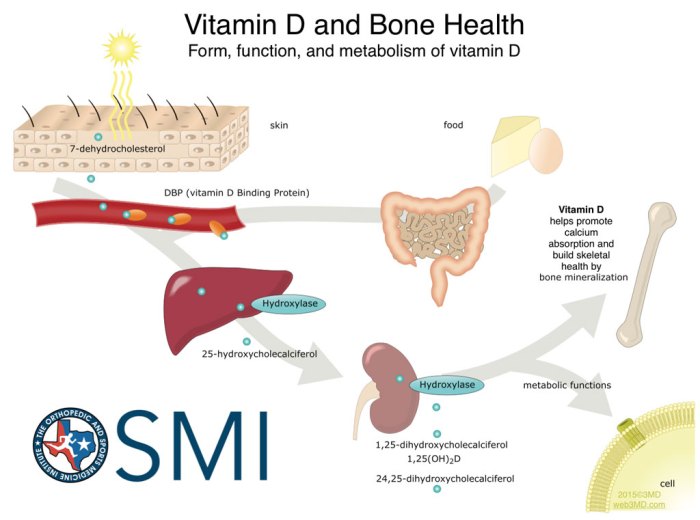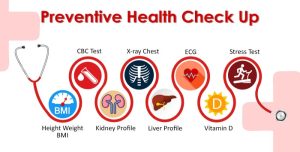
Benefits of vitamin D for bone health and density are crucial for overall wellness. From supporting bone density to enhancing muscle mass, the role of Vitamin D is indispensable. Let’s delve into the myriad benefits of this essential nutrient and how it can elevate your health.
Benefits of Vitamin D for Bone Health and Density
Vitamin D plays a crucial role in maintaining bone health and density by aiding in the absorption of calcium, a key mineral for strong bones.
How Vitamin D Contributes to Bone Health
Vitamin D helps regulate the levels of calcium and phosphorus in the body, which are essential for building and maintaining strong bones. It also promotes the production of osteocalcin, a protein involved in bone formation.
Foods Rich in Vitamin D
- Fatty fish like salmon, tuna, and mackerel
- Egg yolks
- Cheese
- Mushrooms
Eating these foods can help increase your Vitamin D intake and support bone density.
Role of Vitamin D in Calcium Absorption
Vitamin D helps the body absorb calcium from the diet and supplements, ensuring that an adequate amount of calcium is available for bone mineralization. Without enough Vitamin D, the body struggles to utilize calcium efficiently, leading to weakened bones and increased risk of fractures.
Wellness Programs
Wellness programs play a crucial role in promoting overall health and preventing various health issues. Incorporating Vitamin D into these programs can significantly enhance their effectiveness.
Importance of Vitamin D in Wellness Programs
- Vitamin D is essential for bone health and density, which are key components of overall wellness.
- It helps in the absorption of calcium, which is vital for maintaining strong bones and teeth.
- Individuals with adequate Vitamin D levels are less likely to experience bone-related conditions like osteoporosis.
Enhancing Overall Wellness with Vitamin D Supplementation
- Vitamin D supplementation can help in reducing the risk of fractures and falls, especially in older adults.
- It plays a role in supporting immune function, which is crucial for overall well-being.
- Studies have shown that Vitamin D may also have a protective effect against certain chronic diseases.
Impact of Vitamin D on Energy Levels and Mood in Wellness Programs
- Adequate Vitamin D levels have been linked to improved energy levels and reduced fatigue.
- Research suggests that Vitamin D may play a role in regulating mood and reducing the risk of depression.
- Individuals with sufficient Vitamin D levels are more likely to experience a better sense of well-being and overall happiness.
Herbal Remedies
When it comes to supporting bone health and density, herbal remedies can play a significant role in complementing the benefits of Vitamin D. These natural alternatives can provide additional support to ensure optimal bone strength.
Herbs for Bone Density
- Ashwagandha: Known for its anti-inflammatory properties, ashwagandha can help reduce bone loss and improve bone density when combined with Vitamin D.
- Holy Basil: This herb is rich in antioxidants that can protect bone cells and promote bone formation, working synergistically with Vitamin D to enhance bone health.
- Horsetail: Horsetail is a herb high in silica, which is essential for collagen formation and bone mineralization, supporting bone density along with Vitamin D.
Synergistic Effects of Vitamin D and Herbal Remedies
When Vitamin D is combined with specific herbal remedies like ashwagandha, holy basil, and horsetail, the synergistic effects can have a powerful impact on bone health. These herbs work in harmony with Vitamin D to enhance bone density, improve bone strength, and reduce the risk of fractures.
Skin Health
Vitamin D plays a crucial role in maintaining skin health by promoting cell growth, repair, and metabolism. It is produced in the skin upon exposure to sunlight, making it essential for overall skin function.
Benefits of Adequate Vitamin D Levels for Skin
- Enhanced skin barrier function: Vitamin D helps in maintaining the skin’s barrier, protecting it from environmental stressors and reducing moisture loss.
- Anti-inflammatory properties: Sufficient levels of Vitamin D can help reduce inflammation in the skin, leading to a clearer complexion and improved healing of blemishes.
- Wound healing: Vitamin D aids in the production of antimicrobial peptides, which play a crucial role in wound healing and preventing infections.
Effects of Vitamin D Deficiency on Skin Health, Benefits of vitamin D for bone health and density
- Increased risk of skin conditions: Low Vitamin D levels have been linked to various skin issues such as eczema, psoriasis, and acne.
- Premature aging: Vitamin D deficiency can accelerate skin aging, leading to wrinkles, sagging, and dullness.
- Impaired skin barrier: Lack of Vitamin D can weaken the skin’s protective barrier, making it more susceptible to damage and dehydration.
It is essential to maintain adequate levels of Vitamin D through sun exposure, diet, or supplements to support overall skin health and prevent skin conditions.
Bone Density: Benefits Of Vitamin D For Bone Health And Density
Maintaining optimal bone density is crucial for overall bone health and reducing the risk of fractures. Vitamin D plays a significant role in this process by aiding in the absorption of calcium, a key mineral for bone strength and density.
Contribution of Vitamin D to Bone Density
Vitamin D helps the body absorb calcium from the diet and supplements, which is essential for building and maintaining strong bones.
- It promotes the production of osteocalcin, a protein involved in bone mineralization.
- Vitamin D also regulates the levels of calcium and phosphorus in the blood, ensuring proper mineralization of bone tissue.
- It helps in the formation of new bone cells and the remodeling of existing bone, contributing to bone density.
Effects of Vitamin D Deficiency on Bone Density
A deficiency in vitamin D can lead to poor calcium absorption, affecting bone mineralization and density.
- Low levels of vitamin D can weaken bones, making them more prone to fractures and conditions like osteoporosis.
- Deficiency can result in decreased bone mass and density, increasing the risk of fractures, especially in older adults.
- Chronic vitamin D deficiency can impair bone remodeling, leading to reduced bone density over time.
Strategies to Improve Bone Density with Vitamin D
Ensuring adequate vitamin D levels through supplementation and lifestyle changes can help maintain and improve bone density.
- Regularly consuming vitamin D-rich foods like fatty fish, fortified dairy products, and eggs can support bone health.
- Exposure to sunlight is essential for the body to produce vitamin D naturally, contributing to optimal bone density.
- Consulting with a healthcare provider for vitamin D supplementation based on individual needs can help in reaching recommended levels for bone health.
Muscle Mass

Vitamin D plays a crucial role not only in bone health but also in muscle function and strength. Let’s explore how Vitamin D impacts muscle mass and why it is essential for overall muscle health.
Connection between Vitamin D and Muscle Mass
Vitamin D receptors are present in muscle tissue, indicating the importance of this vitamin in muscle function. It is believed that Vitamin D helps in muscle protein synthesis, which is vital for muscle growth and repair.
- Vitamin D promotes the absorption of calcium, which is necessary for muscle contractions.
- Studies have shown a correlation between Vitamin D levels and muscle strength, suggesting that deficiency can lead to muscle weakness.
It is essential to maintain adequate levels of Vitamin D to support optimal muscle function and prevent muscle weakness.
Impact of Vitamin D Deficiency on Muscle Mass
Vitamin D deficiency can have a significant impact on muscle mass, leading to muscle weakness, fatigue, and decreased muscle function. This deficiency can result in conditions like osteomalacia or muscle myopathy, affecting overall mobility and strength.
- Low levels of Vitamin D have been linked to a higher risk of falls and fractures due to muscle weakness.
- Supplementation with Vitamin D has shown improvements in muscle strength and function in individuals with deficiency.
Regular monitoring of Vitamin D levels and incorporating Vitamin D-rich foods or supplements can help maintain muscle mass and strength, especially in individuals at risk of deficiency.
Final Wrap-Up

In conclusion, the significance of Vitamin D for bone health and density cannot be overstated. By incorporating this nutrient into your daily routine, you can fortify your bones, improve muscle function, and boost overall wellness. Embrace the power of Vitamin D and reap the numerous benefits it offers for your health.
FAQ Explained
How does Vitamin D contribute to bone health?
Vitamin D plays a crucial role in aiding calcium absorption, which is essential for maintaining strong bones.
What are some examples of foods rich in Vitamin D?
Foods like fatty fish, fortified dairy products, and egg yolks are excellent sources of Vitamin D that can support bone density.
Can Vitamin D supplementation enhance overall wellness?
Yes, Vitamin D supplementation is important for overall wellness as it can improve energy levels and mood, among other benefits.






